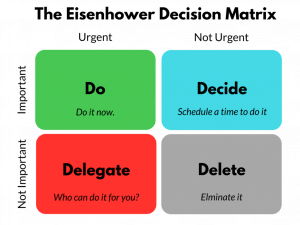
Reflections October 2020 – Week 4
October 26, 2020
Reflections October 2020 – Week 5
November 2, 2020Over the past 6 weeks we explored the topic of time management in depth here at Polymensa. Alongside reading books such as (The One Thing, Eat The Frog and Deep Work - full reading list at the end of this article), we had the opportunity to hear 4 unique perspectives on this topic:
- A special ops sergeant (US Military)
- Rebecca Brennan (former agency MD and Ultrarunner)
- Mark Hunter OBE (Olympic Gold Medalist Rower)
- Simon Norris (founder of a 130 person UX/Service Design agency)
Feel free to go back to whatever you were doing before you started reading this. Or would you like to follow me on a brief exploration of ‘time’ in the context of your personal and working life. For giving up your generous time, I’ll promise a few nuggets on how to make the most of time.
There are many ways to break something, but only one way to put it back exactly the way it was. Is that possible though? Because even while you try to fix the present, you’re constantly moving into the future. This is a scary thought knowing everything you do right now can never be fully restored or undone.
What are your values around time?
- Are you scared of losing time, therefore want to make the most of each minute?
- Are human relationships key to you and the time you spend with them a priority?
- Do you want to achieve something no one has ever achieved?
Perhaps it doesn’t matter what time management framework you use. Instead it’s about why you are doing something. Then fitting the framework around that purpose.
A single point of focus
Mark Hunter trained tirelessly for 4 years just to face the bitter reality of coming last in the 2004 Athens Olympics. His single point of focus was to win gold at the Olympics. Mark mentioned setting out a detailed 4-year plan that would eventually lead to winning gold at the 2008 Beijing Olympics. Every component of his time management framework was built around this single goal.
Meet a mate or train? Sleep late or go to bed early to be fresh for the next training day? These decisions are relatively easy. A more challenging question is: Meet a mate who is really ill and miss the race that is needed to enter the Olympics or miss your final chance to meet your mate, but move a step closer to Olympic gold? Luckily Mark wasn’t challenged with this particular question. But the point here is made: Choose your values around time and manage your time around those values.
Chronos and Kairos
The ancient Greeks looked at time in two ways:
- Chronos. Symbolically refers to looking at time in a linear way.
- Kairos. The moment in which something happens.
Many smart people have since come up with new ways to define time. But there is something romantic and meaningful about Kairos. An opportunity to be seized. Or how you decide to spend that moment in time? Not about how often you decide to see an ill loved one, but whether that hour is spent with your full presence. Or the moment a team member breaks down in tears over the loss of a family member and despite you having a to do list of a 1000 items, how you spent the next 10 minutes with this person might change their life forever.
'Showing up'
Mark Hunter mentioned that his rowing partner was not a morning person. The problem was that whenever he’d come into training disgruntled, it would impact the performance of the entire team that day. He was then asked to spend 10 minutes getting into the right mood before entering the training area.
Frameworks
There are many time management techniques, here are two that have been mentioned most frequently.
Ivy Lee technique
Suitable for time planning.
At the end of each day, write down the six (and only 6) most important things you need to accomplish tomorrow. Rank each of those 6 items on a separate sheet of paper in a descending list of true importance (you can use the Eisenhower box to help with this).
When you begin work, focus the first portion of your day (or when you are most productive - see ultradian rhythm for one way to explore this) exclusively on the first item that you wrote down until it is accomplished. Once the first task is complete, move down the list in the same fashion until the end of the workday. Whichever items were incomplete (if any) will be moved to your list for the following day. Rinse and repeat.
Further reading on this technique
Eisenhower Box
Suitable for prioritisation.
Further reading on the technique here

Chronotypes
Apparently the military puts a lot of emphasis on figuring out the various chronotypes of their recruits. Taking a chronotype test allows you to understand when in the day you are most productive. Most people fall into either morning or evening productivity peaks. Knowing your Chronotype may increase your overall efficiency, as you’ll be able to plan around your rhythm. Perhaps leaving a piece of work unfinished, if your creativity is down and continuing it the next day.
Meeting efficiency
The main reason meetings are inefficient in the military are because the leaders with limited knowledge are involved. This was a hugely alarming point for the agency leaders in our group that have a tendency to be far more hands on. For the agency leaders who appeared to be superior in their time management, avoiding involvement in most meetings was key.
Communication with team members
There were a few recurring questions that were identified as being helpful to delegate - yet maintain an open door policy to make team members feel heard.
One scenario, you are asked at the office or in the team chat if you have 5 minutes. Rebecca’s response: "Is it really a 5 minute question?” If it’s not then there was a separate meeting time booked in to discuss the matter.
Another scenario in an open ‘door policy’ culture to the agency founder, when someone wants to share a problem they have. Simon Norris from Nomensa said his response tends to be: “Do you just want to tell me something or would you like me to take action?”
Prioritise when to work at your max effort
We often try to work at 100% for as long as possible and then stumble into our holiday. Recharge and go again at max intensity. Mark Hunter raised the point that during his rowing career they planned a year ahead of time which races they would give 100% and when 80% is enough. How often do you rush into a pitch with last minute presentation changes? When deep inside you knew that maybe another task at 80% would have given you that extra 20% to go into the pitch 100% match ready.
Alignment of team, but acknowledge different characters
In a documentary aired on Netflix called ‘The Last Dance’ - legendary Chicago Bulls coach Phil Jackson identified the unique personalities of each player. When Dennis Rodman, who was the wild child of the team, had not showed up for training and asked to stay another night partying in Las Vegas. Phil had the tough decision to make whether to accept Rodman’s personality, trusting he would come back and be match fit. Or enforce a rule that may not fit the personality type. He chose to let him be, as long as he would be back for the next game. Dennis Rodman went on to play one of the best games of his career on his return.
Book recommendations
Eat That Frog
“Eat that frog!” means to start your day with the biggest, most important, and most dreaded task. It's also the task you are most likely to procrastinate on. Brian Tracy is also about disciplining yourself to eat that frog first thing in the morning every single day.
Atomic habits
The key message in this book summary: A tiny change in your behavior will not transform your life overnight. But turn that behavior into a habit that you perform every day and it absolutely can lead to big changes. Changing your life is not about making big breakthroughs or revolutionizing your entire life.
Tiny Habits
Tiny Habits shows you the power of applying small changes to your routine to unleash the full power that habits have to make your life better. (similar to above)
4 hour work week
The 4 Hour Work Week is the step-by-step blueprint to free yourself from the shackles of a corporate job, create a business to fund the lifestyle of your dreams, and live life like a millionaire, without actually having to be one.
The new one minute manager
This book is all about delegation.
Deep Work
The book is split into two parts. The first explains why deep work maximizes productivity and why only few people practice it. The second part shows us how to actually do it and make deep work a regular practice in our lives.
The One Thing
The ONE Thing is the best approach to getting what you want. Where Keller has had huge success, he had narrowed his concentration to one thing, and where his success varied, his focus had too. When you want the absolute best chance to succeed at anything you want, your approach should always be the same. Go small.
There is no right or wrong time management - it has to fit your end goal and lifestyle. The far bigger question, however, is what are you going to do with your time and why? And on that note... will leave you with this beautiful analogy of our life clock.
#InfiniteLearner





